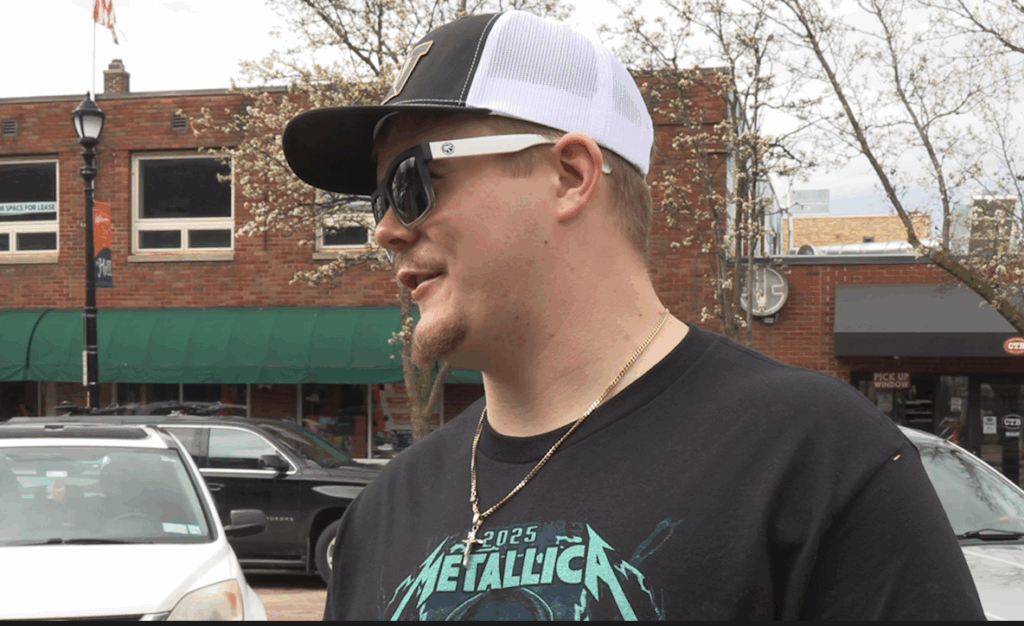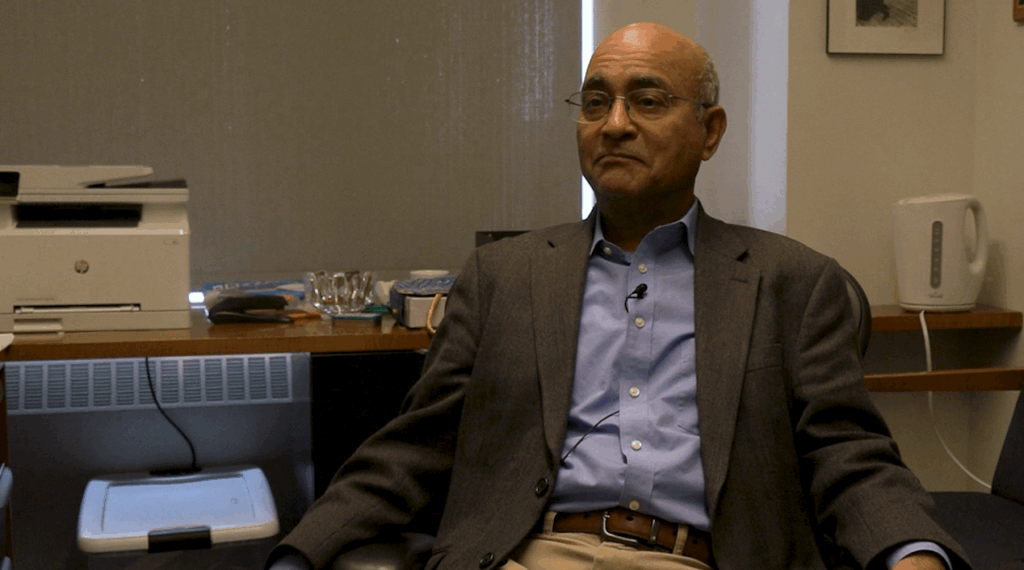VIDEO TRANSCRIPT: Central New Yorkers react to the Wall Street downturn
Jack Ziskin: Trump’s inauguration, and Federal Reserve Chairman Jerome Powell has been sounding the alarm, saying the tariffs with a negative impact on the economy, including higher inflation and slower growth. But some people in Syracuse remain optimistic.
Lisa Dake: Yeah, but the thing is what comes down eventually goes back up.
Justin Lacelle: There’s going to be a slight decline. But it’s all going to go back up.
Ziskin: So you’re feeling optimistic?
Lacelle: Absolutely I believe in President Donald J. Trump.
Ziskin: Despite their confidence in the market. Stock prices continue to fall. And on Monday, the front page of the Wall Street Journal read “Dow headed for worst April since Great Depression.” Syracuse finance professor Ravi Shukla says there’s no easy fix.
Ravi Shukla: In the long run, it’s possible that those things will get made in the U.S. to avoid the tariffs. But then the cost of production in the U.S. is also pretty high, because the cost of labor in the US is pretty high and so the consumers will end up paying higher prices. And that’s what the market is reflecting.
Ziskin: Shukla says we won’t feel the full impact of tariffs right away, but if these new taxes remain in place, then prices will rise and spending will fall. And although there’s no safe bet in today’s market, that doesn’t mean you should stop investing altogether.
Shukla: Lots and lots of research that shows that if people sit on the sidelines waiting for the right time to invest in the market, they lose more than if they are invested in the marketplace.
Ziskin: With J.P. Morgan forecasting a 60% chance of a recession. Shukla says he is fortunate that he doesn’t have to sell his assets in a bear market.
Shukla: If you have to take money out. I just feel bad for you.
Ziskin: Shukla hopes the administration rolls back tariffs before more Americans lose money. From Syracuse, New York. Jack Ziskin, NCC News.
SYRACUSE, N.Y. (NCC News) – Wall Street is in retreat, and the numbers are bleak. Since President Donald Trump’s inauguration, the stock market has fallen by 15%, a sign that investors are bracing for a possible recession, which has prompted warnings from the highest levels of the financial world.
Federal Reserve Chairman Jerome Powell has raised concerns that tariffs imposed during Trump’s presidency are having a lasting negative effect on the U.S. economy.
“It is now becoming clear that the tariff increases will be significantly larger than expected. The same is likely to be true of the economic effects, which will include higher inflation and slower growth,” said Powell.
And while those in financial circles are paying close attention, not everyone is panicking — at least not yet.
Syracuse Investors Stay Hopeful

Justin Lacelle, who owns stock, remains confident that the market will bounce back, © 2025 Jack Ziskin
In Syracuse, some remain optimistic despite grim headlines.
Justin Lacelle, a stock owner, is firm in his belief that the market will rebound.
“There’s going to be a slight decline, but it’s all going to go back up, said Lacelle.”
When asked why he remains optimistic, Lacelle responded with zero hesitation.
“Absolutely, I believe in President Donald J. Trump, said Lacelle
Another person who owns stock, Lisa Dake, is hopeful for a rebound.
“Yeah, but the thing is, what comes down eventually goes back up, ” said Dake.
Their optimism stands in contrast to national headlines.
On Monday, The Wall Street Journal ran a front-page story with the warning: Dow Headed for Worst April Since Great Depression.
The Cost of Tariffs

Syracuse Finance Professor Ravi Shukla © 2025 Jack Ziskin
Ravi Shukla, a finance professor at Syracuse University, says there are no easy answers if tariffs remain in place.
“In the long run, it’s possible that those things will get made in the U.S. to avoid the tariffs, but then the cost of production in the U.S. is also pretty high, because the cost of labor in the U.S. is pretty high, and so the consumers will end up paying higher prices.”
Investors are anticipating that consumers will spend less if prices go up.
“If the tariffs remain where they are, the higher prices are here to stay,” Shukla said.
That’s why some Americans are racing to buy cars before tariffs go into place.
“We are not feeling the effect immediately. We’ll start feeling the effect in about three months. And then the prices will go up 10, 15, 20% or higher. And we’ll just have to learn to live with them,” Shukla said.
This has led to increased anxiety for retirees who rely on their 401k to meet their basic needs and live comfortably. With the market down and prices up, their futures remain uncertain.
“I don’t know that there is a safe investment at the moment in America,” said Shukla.
Investment Advice in a Bear Market
For those worried about what to do with their money, Shukla offers a simple rule: stay invested.
“There’s lots and lots of research that shows that if people sit on the sidelines waiting for the right time to invest in the market, they lose more than if they are invested in the marketplace,” he said.
That doesn’t make things easier for those who need to access their funds now, like retirees.
JPMorgan forecasting that there is a 60% chance of a recession this year, Shukla acknowledges that many Americans may be forced to sell in a down market.
“If you have to take money out, I just feel bad for you,” he said.
Looking Ahead
For now, Wall Street remains volatile, and Americans are bracing for what comes next. Shukla hopes the Trump administration will consider rolling back tariffs before more households and businesses are hit by higher prices.
The Trump Administration has been trying to force countries like China to come to the negotiating table.
Republicans in Congress have often called Trump a deal maker, a not so subtle nod to his book, The Art of the Deal.
So far, China and other countries are refusing to deal.
Experts like Shukla agree that tariffs are bad for the economy.
So the question isn’t whether or not Wall Street is wrong, or if this is a momentary setback, it’s how far markets will fall, and how long it will take Americans to recover.
